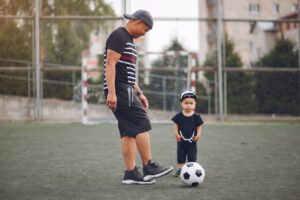Potty training. And if you’re a parent, you know how terrifying that phrase is. The perpetual fight of getting your toddler to realise what the bathroom is for, handling accidents, and not knowing “if” you’re doing it “right”.
And while, according to the American Academy of Pediatrics, nearly half of children are fully potty-trained at 36 months, that doesn’t leave many babies who take longer, which is fine! And the question remains, in a week?
Yes, it can. In this article, we will tell you just how. The best thing you can do as a new or seasoned parent is take the following tested and easy steps to potty train your toddler in just seven days.
There are no gimmicks or magic wands, just a little consistency, patience and awareness of your child’s needs.

Are You Potty Training When Your Child Is Too Young?
First things first. And when do you potty train them? The answer is different, but generally, they’re ready from 18 months to 3 years of age. The trick is not to hurry it. Check for readiness: your child might be ready:
Facial Signs: They are dry longer (at least 2 hours), and bowel movements are more regular.
Psychic Clues: They’re interested in what you do in the bathroom, like flushing or washing your hands.
Behavioural Traits: They hide when they have an accident or get annoyed when their diaper is soiled.
Rushing a toddler when they’re not ready will be tough for you both, but starting when they’re ready will be easier.
The One-Week Potty Training Method
Then, on to the method that gets your child potty-trained in a week. Yes, you can, but you need to focus, stick to it and know. Here’s a step-by-step breakdown:
Day 1: Prepare The Ground.
Prepare yourself in your head for one week of complete concentration. Set the time and promise yourself a stay for the first couple of days. Consistency is important. *The American Academy of Pediatrics* says this. And you can’t make a kid learn to potty in all environments if you are taking them in and out of them.
Introducing the Potty: Let your child test the potty. You can get a baby potty or a training seat on the regular toilet—whatever works for your kid. You can also take a potty chair and sit your child wearing clothes so they can get used to it.
Learn the Rules: Teach them how to go potty. Say we go in the potty and not in diapers. Put things as clear and direct as, “When we have to pee or poop, we go to the potty.”
Encourage, Don’t Pressure: Make it fun! If they’re trying to potty train, applaud them, but don’t treat it as a chore.
Day 2: Make the Switch.
Two days in, diapers are off the table (not for nap and bed). This might be the most difficult, as toddlers can even be stuck on their diapers for support, but you’ve got to persevere.
Don’t Use Wipes: Insist your toddler’s underwear at home. You can even try training pants that are the shape of diapers, but they pop right up and down. This helps most parents, especially when changing out of diapers.
Most Potty Breaks: Go potty with them once every 30 minutes. Get involved and say, “Let’s sit on the potty.” Even if they don’t have to go, it gets them started.
Be On The Lookout For Signs: Toddlers are not yet attuned to the sensation of leaving. Be careful what they do. If they begin to crawl, jump, or run, run them to the potty.
Day 3: Concentrate on Motivation.
This day is about reward. Potty training isn’t instant, and some toddlers get potty training within the first two days; others take longer.
Stand up, Speak up, Speak up: For all successes, no matter how small, Shout them! Whether it is waiting on the potty for a few seconds or going, celebrate. Use words like, “Great job! You’re so big now!”
Stay Tracked: Some parents like to stay on track with their toddlers. Do a sticker chart or fun potty training app. Little ones like to think of getting something in return.
Follow the Plan: Stick to potty visits daily and wear underwear. Remind them that going to the potty is part of the day.
Day 4: You Can Accident It.
Your baby will have accidents around day 4. This is normal. Potty training doesn’t have to be perfect; it just has to work.
Be Relaxed and Confident: If your child falls, don’t panic. Don’t fuck them, and don’t make them feel bad. Say, “Oops, accidents happen. Let’s dust and come back next time.”
Don’t Shame: The idea is to get them comfortable with it. They’ll hold up once they begin to think of potty training in terms of shame.
Sharing the Good: Sharing on their positive side. When they can potty every time, make it a big deal. This reinforcement keeps them motivated.
Day 5: Maintain Consistency is Vital.
The fifth day or so might be when your child starts getting the hang of it, but you must stick to it. Here are a few tips for you:
Remain In Tune with Timing: Continue taking them to the potty 30-60 minutes at a time. During a travel day, know where the nearest bathroom is.
Push Independence: Get them to begin pant-drawing and using the potty independently. This will inculcate their sense of achievement and agency.
Hurry They Grow Out of It: If they start working independently, praise them for being more independent.
Day 6: Building Confidence
Your toddler is just getting on top of potty training on day six. Maybe they still have the occasional accident, but they should grow more confident.
Let Them Play a Little: If you are up to it, let them try the potty without you. After that, let them pull up their pants, wash their hands, and flush.
Repeat the Process: Continue praising and encouraging. Make sure it’s the same so they know what to expect.
Nighttime Training: Potty training at night is often the most difficult as toddler’s bladders are still developing. You’ll probably have to wear diapers or pull-ups at night for a while. But some kids will sleep dry at night by the end of the week, others a bit later.
Day 7: Keep a Push, Don’t Stop, Don’t Give Up.
Usually, your kid will be all day potty trained by the end of the week.
Hurry up Success: At the end of the week, hug your child for a job well done. And they’ve developed a lifelong craft.
Be Consistent: The first couple of weeks matter. Remind her of the potty and not changing in diaper habit. And this regularity is what you need to stay the course.
Tips for Success
A week might feel like a short period, but remember that every child is different. Voici quelques autres hints to make it even easier:
Hurry: Some toddlers take longer to get used to it than others. Don’t stress if your baby doesn’t completely learn by the end of the week. Keep practicing.
Put a reward in place: Other parents encourage their children by offering small incentives such as stickers, a treat, or extra time at the playground. It’s just that you better get something they can treasure.
Be still after failure: You will get in some accidents. You don’t want to take it back. Stay calm and supportive.
Final Thoughts
Potty training doesn’t have to be an ordeal. With consistent positive guidance, you can get your toddler excited and confident on the potty after only one week. Recall that the secret of success is patience, support, and persistence. Your toddler will soon be on his way to not wearing a diaper!
You can read more professional potty training tips from *The American Academy of Pediatrics* [here](https://pediatrics.aappublications.org/content/early/2016/09/14/peds.2016-1890) and Parent’s Magazine [here](https://www.parents.com/toddlers-preschoolers/potty-training/).
LET ME KNOW if you want me to make or modify anything on this!
